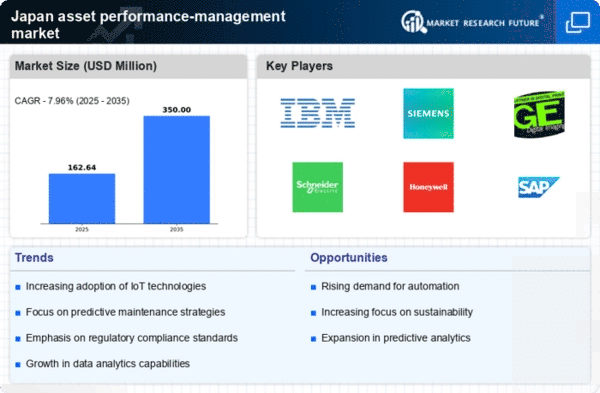Regulatory Compliance and Standards
In Japan, stringent regulatory compliance requirements are significantly influencing the asset performance-management market. Organizations are compelled to adhere to various standards, including environmental regulations and safety protocols. This compliance not only ensures operational integrity but also enhances the reputation of companies in the market. As of 2025, it is estimated that compliance-related investments will account for nearly 20% of total expenditures in the asset performance-management market. Companies that proactively address these regulations are likely to experience improved asset performance and reduced risks associated with non-compliance. Thus, the focus on regulatory adherence is a critical driver shaping the asset performance-management market landscape.
Focus on Data-Driven Decision Making
The asset performance-management market is witnessing a paradigm shift towards data-driven decision making. Organizations are increasingly leveraging data analytics to inform their asset management strategies, leading to improved performance outcomes. By 2025, it is expected that data analytics will play a crucial role in approximately 30% of asset management decisions. This trend is indicative of a broader movement within the market, where companies are prioritizing data collection and analysis to enhance asset reliability and performance. The emphasis on data-driven approaches is likely to foster innovation and improve overall efficiency in the asset performance-management market.
Increased Investment in Infrastructure
Japan's ongoing investment in infrastructure development is significantly impacting the asset performance-management market. The government has allocated substantial budgets for upgrading and maintaining critical infrastructure, which necessitates effective asset management strategies. By 2025, it is projected that infrastructure-related expenditures will contribute to a 10% increase in the asset performance-management market. This investment is driven by the need to enhance the longevity and reliability of assets, particularly in transportation and utilities. As a result, companies are increasingly adopting asset performance-management solutions to ensure that infrastructure investments yield optimal returns and maintain operational efficiency.
Rising Demand for Operational Efficiency
The pursuit of operational efficiency is a primary driver in the asset performance-management market. Organizations are increasingly recognizing the importance of optimizing their asset performance to enhance productivity and reduce costs. In 2025, it is anticipated that the market will witness a growth rate of around 12% as companies invest in solutions that streamline operations and improve asset reliability. This trend is particularly evident in sectors such as manufacturing and energy, where asset downtime can lead to substantial financial losses. Consequently, the emphasis on operational efficiency is propelling the adoption of advanced asset management practices within the asset performance-management market.
Technological Advancements in Asset Management
The asset performance-management market is experiencing a surge due to rapid technological advancements. Innovations in software and hardware are enhancing the capabilities of asset management systems. For instance, the integration of advanced analytics and machine learning algorithms is enabling organizations to optimize asset utilization and reduce operational costs. In 2025, the market is projected to grow by approximately 15%, driven by the demand for more efficient asset management solutions. Companies are increasingly adopting these technologies to improve decision-making processes and enhance overall asset performance. This trend indicates a shift towards more data-driven approaches in the asset performance-management market, as organizations seek to leverage technology for competitive advantage.
















